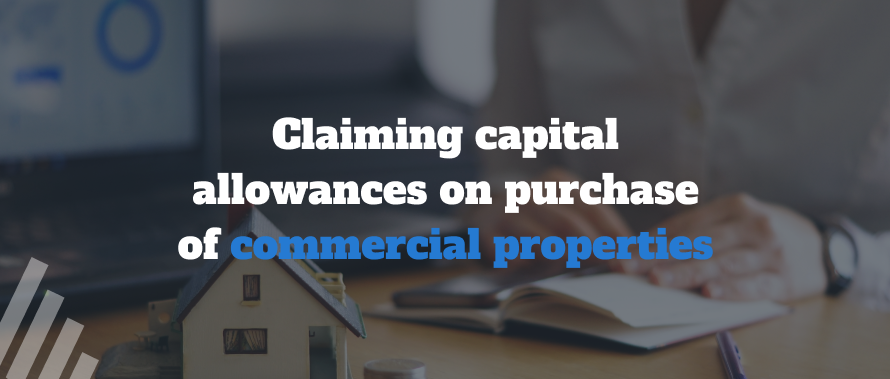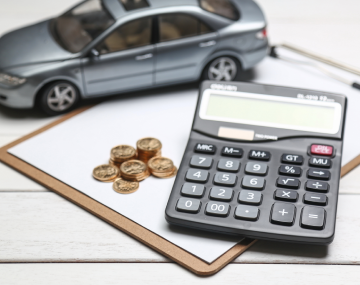Understanding taxes and claiming refunds and benefits can be confusing when youre a business owner. That’s why its important to have a good accountant who can advise you on whats best for your business and tell you the easiest ways to reap the benefits of owning commercial property. Its important to note that capital allowance expenditure is separate from day to day running costs and only allows you to claim tax relief on assets bought for a business or commercial property.

Most commercial property owners will be aware of capital tax allowances. Still, they may not be getting the full benefits of claiming tax reliefs and tax deductions on their own property. Im sure if you purchase commercial property, you have an accountant, and however, one of the things a lot of generic accountants miss out on is claiming all of the available capital allowances on commercial property.
So, the first question we should answer is: “what are the different kinds of Capital Allowances?”
What are the different kinds of capital allowances?
-
Annual investment allowance
– The first kind of capital allowance is "Annual Investment Allowance" (AIA). You can claim an annual investment allowance (AIA) against most plants and machinery except for cars not kept on the business premises. AIA means a business can deduct the full cost of an item from its profits before tax and could claim up to £1 million on an Annual investment allowance. However, you may need to pay tax if you sell the item after claiming AIA. -
Written down allowance
– The second kind of capital allowance is "written down allowance". Written down allowance cover items that do not qualify under AIA (for example, cars) and any items beyond the AIA threshold. -
First-year allowance
- The final capital allowance is the "first-year allowance". This capital allowance encourages businesses to purchase energy and water-efficient equipment, for example, zero-emissions vehicles. As with any other capital allowances, you cannot claim anything on items you have bought through your business to lease to other people or using within a home you let out.
Also See: Don’t Forget to Pay your Capital Gains Tax within 30 Days
What capital allowances may be available?
Well, there are several things, actually! A commercial property owner will likely have previously claimed tax refunds on "moveable" objects. Movable objects include things like desks, chairs and basic furnishing, on the basis of which a lot of commercial properties need to function. An accountant can see these things simply by looking at your books and submit them to HMRC for the relevant tax deductibles and reliefs.
What does Plant and machinery include?
Plant and Machinery include:
- Items purchased that are used in the business, such as cars.
- Fixtures such as fire alarms, CCTV systems, fitted kitchens or bathroom suites.
- Changes made to a building to install other plants and machinery (does not include repairs).
- Costs of demolishing plant and machinery.
Integral features are:
- Any moving walkway (lifts, escalators).
- Hot and cool water systems (does not include toilet and kitchen facilities).
- Space and water heating systems.
- Air-conditioning and air cooling systems.
- Electrical systems (includes lighting systems).
- External solar shading.
Its important to note that this is not an exhaustive list and can be added depending on the business needs. You can also claim a capital allowance for things such as renovating business premises in disadvantaged areas, research and development, extracting minerals, patents, dredging, and structure and buildings.
“So why these things are often not included when claiming capital allowance?”
Well, the answer is simple. To include these objects, the accountant will have to survey the property to understand exactly what is tax-deductible and what’s not? By doing the survey, they will also understand any fixtures purchased by previous owners which are transferred to the new owner with an agreement. Usually, its only Capital allowance expert accountants who can make this possible and who have an excellent understanding of things by which you can avail tax reliefs and lower down your tax liability.
Not only this, capital allowance means that you could be sitting on a lot of unused tax deductibles and benefits as a commercial property owner.
This has never been more relevant than now, during Covid times. To support businesses and encourage growth, the government has introduced “super deduction” as an incentive to encourage companies and businesses to invest in plants and machinery.
Also See: Super deduction and first-year capital allowances
Super Deduction allowance
This super deduction means that any expenditure incurred from 1 April 2021 until the end of March 2023 can be claimed back at 130% on capital allowances (if the investments qualify, of course), which means that for every £1 a company invests, they’ll receive a tax cut of up to 25p.
One of the extensive grey areas in these circumstances is transferring capital allowance computations when a property is bought. Legislation introduced a few years ago says that the person or company selling the property should include its capital allowance computations even if the business was unsuccessful and no claims were made for the fixtures. An agreement must be made with the new owner in order to transfer the value of these assets.
A person can claim valuable tax relief even years after purchases are made, so this is essential for the new owner that they can make use of any tax refunds or deductibles. Usually, this is a situation dealt with by solicitors; however, many will state that they have no interest in claiming capital allowances, leading to disastrous consequences on both the buyer’s and sellers side.
Working out the value of these items is simple as its usually based on market value, so what you paid for it at the point of purchase. You can submit all of these claims along with your tax return at the end of the tax year. Claiming capital allowances is an intelligent way to minimise your business tax bills and help provide some tax relief when purchasing any plant or machinery for a commercial property.
Structures and building allowance
In the 2018 Budget, the government has introduced the Structures and Buildings Allowance, which applies to new non-residential structures and buildings. Relief is available on eligible construction costs incurred on or after 29 October 2018 on a straight-line basis at an annual rate of 2%. It means that costs that previously did not qualify for Capital Allowances may now qualify. Businesses should not presume that costs do not qualify simply because they previously did not.
Conclusion
After learning and understanding all the different kinds of capital allowances, I think it’s fair to say the best option to reap the tax benefits of purchasing commercial property is to have an accountant who should be a capital allowance expert and can guide you and your business throughout the process, and ensure you avail all the available benefits.
It’s always best to do your research and seek out the best accountant who understands your business needs and provide support in all areas. There are a number of firms that offer capital allowance claims as part of the service, so I’m sure finding the right fit will be much simpler than it sounds.
Capital allowances are an extremely valuable tax relief that can significantly reduce your tax liability, but they are often overlooked. DNS Accountants have extensive experience helping businesses claim capital allowances and ensure that you will get the maximum tax reliefs that ultimately helps in lowering down your tax bills. Early and specialist advice is critical, and the cost of this advice is typically significantly outweighed by the potential tax savings. You must not miss this one!
In case you have any queries or want specialist advice on "Claiming capital allowances on purchase of commercial properties”, kindly call us on 03330886686, or you can also e-mail us at enquiry@dnsaccountants.co.uk.
Disclaimer :- “This article was correct at the date of publication. It is intended for general purposes only and does not constitute legal or professional advice. Independent professional advice should be sought before proceeding with any transaction”.
Also See: Building a Garden Office: What are the tax implications?
Any questions? Schedule a call with one of our experts.








